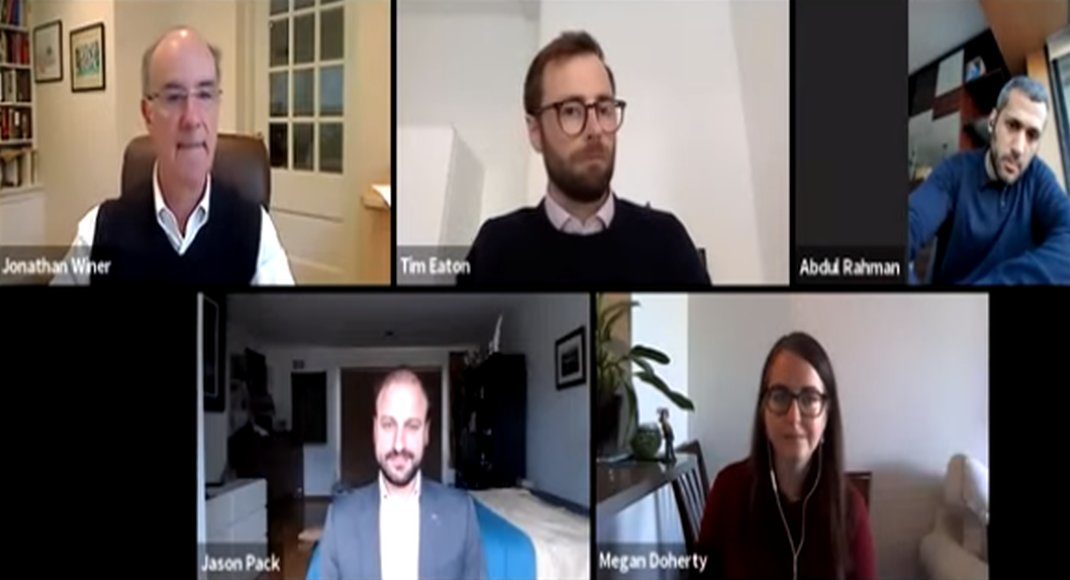 Since the overthrow of the regime of Muammar Gaddafi in 2011, Libya’s multitude of armed groups have followed a range of paths.
Since the overthrow of the regime of Muammar Gaddafi in 2011, Libya’s multitude of armed groups have followed a range of paths.
While many of these have gradually demobilized, others have remained active, and others have expanded their influence.
Given the degree to which most armed groups are embedded in local society, successful engagement will need to address the fears, grievances and desires of the surrounding communities.
The Middle East Institute (MEI) is pleased to host a virtual panel discussing the findings of a recently published Chatham House research paper, “The Development of Libyan Armed Groups Since 2014: Community Dynamics and Economic Interests,” which presents insights from over 200 interviews of Libyan armed actors and members of local communities.
The panel will seek to answer the following:
- What are the possible trajectories of Libya’s conflict given the current pandemic?
- What is the future of its economic system with the crashing price of oil and the likely implosion of the Libyan healthcare system?
- How can international actors influence the chances of a sustainable settlement to the conflict?
Speaker Biographies:
Abdul Rahman al-Ageli
Associate fellow, Chatham House, MENA Programme
Abdul Rahman Alageli is an associate fellow at Chatham House’s Middle East and North Africa Programme, based in Tripoli, Libya.
al-Ageli began working with the stabilization team of the Libyan Prime Minister’s Office, the Military Council and the Supreme Security Committee in 2011.
He went on to be the national security file coordinator in the Office of the Libyan Prime Minister, and was also rapporteur then deputy head of the Inter-Ministerial Committee on Border Security, and a member of the Libyan government’s National Security Coordination Team until 2015.
He was also a non-resident fellow at the Rafik Hariri Centre for the Middle East at the Atlantic Council from 2015 to 2017.
He is a founder of the Libyan Youth Forum, one of the largest and earliest youth organizations created during 2011, as well as being a founding member of the Libyan Experts Forum and the World Economic Forum’s Global Shapers Hub in Tripoli.
Megan Doherty
Senior director for Policy and Advocacy, Mercy Corps
Megan Doherty is Mercy Corps’ senior director for Policy and Advocacy. She previously served in the U.S. Department of State as a Senior Advisor in the Near Eastern Affairs Bureau and as Senior Coordinator for U.S. Assistance to Libya.
She also served as the White House National Security Council Director for North Africa from 2015-2016.
Doherty has spent more than a decade designing, implementing, and overseeing conflict mitigation, governance, and civil society programs in the Middle East and North Africa.
She served with the National Democratic Institute in Benghazi and Tripoli from 2011-2012. While in Libya she worked with nascent political parties, transitional governing institutions, and civil society organizations, including Libya’s first election observation network.
She also trained women candidates who later won seats in Libya’s first elected parliament and conducted extensive public opinion research on post-Qadhafi Libya.
In 2010 she co-authored Confidence, Capacity, Connections: A Young Woman’s Guide to Leadership.
She also held positions with Human Rights Watch and Amnesty International.
Tim Eaton
Senior research fellow, Chatham House, MENA Programme
Tim Eaton is a senior research fellow with Chatham House’s MENA Programme. His research focuses on the political economy of the Libyan conflict.
In 2018, he authored a report on the development of Libya’s war economy which illustrates how economic activities have become increasingly connected to violence.
Previously, he managed Chatham House’s research on the Syrian conflict.
Prior to joining Chatham House, he worked for BBC Media Action, BBC’s international development charity, on projects in Iraq, Egypt, Tunisia and Libya.
In Libya, Eaton helped to set up and manage BBC Media Action’s bureau from 2013 until 2014.
He is a regular contributor to the media, having written for the Washington Post, BBC, Newsweek, CNN, War on the Rocks and the New Statesman, among others.
Jason Pack
Founder, Libya-Analysis LLC and non-resident scholar, MEI
Jason Pack is a consultant, author, and commentator with over two decades of experience living in, and working on, the Middle East. In 2004, he was a Fulbright Scholar in Syria.
In 2008, he moved to Tripoli to assist Western businesses in reentering Libya amidst the late Qadhafi-era reforms.
In 2011, Pack created Libya-Analysis LLC — a consultancy organization producing evidence-based analysis, forecasting, business intelligence, and commercial research on Libya.
In 2015, Pack founded Eye on ISIS in Libya — a non-profit 501c3 monitoring service detailing the group’s history, its interactions with other jihadi actors, and Western actions toward the group.
In 2016, he became the senior Libya analyst at CRCM North Africa, a German strategy firm. In 2017-18, he served as executive director of the U.S.-Libya Business Association.
Currently, he is working on a popular book exploring what Libya’s dysfunctional economic structures and its ongoing civil war tells us more broadly about globalization and the geopolitics of the 21st century.
Jonathan Winer, moderator
Jonathan M. Winer has been the United States Special Envoy for Libya, the deputy assistant secretary of state for international law enforcement, and counsel to United States Senator John Kerry.
He has written and lectured widely on U.S. Middle East policy, counter-terrorism, international money laundering, illicit networks, corruption, and U.S.-Russia issues.
In 2016, Winer received the highest award granted by the Secretary of State, for “extraordinary service to the U.S. government” in avoiding the massacre of over 3,000 members of an Iranian dissident group in Iraq, and for leading U.S. policy in Libya “from a major foreign policy embarrassment to a fragile but democratic, internationally recognized government.”
In 1999, he received the Department’s second highest award, for having “created the capacity of the Department and the U.S. government to deal with international crime and criminal justice as important foreign policy functions.”
The award stated that “the scope and significance of his achievements are virtually unprecedented for any single official.”
______________




